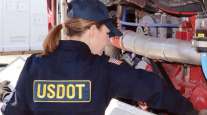U.S. Regulators, Hill Set Focus on Reincarnated Carriers
This story appears in the June 11 print edition of Transport Topics.
For Maryland-based Gunthers Transport, a November 2011 federal out-of-service order was not the end of the road for the family trucking business.
Shortly after getting shut down, the company transferred its vehicles and employees to Clock Transport — a company established weeks earlier by Mark Gunther Jr., son of Gunthers owner Mark Gunther, and at the same address, federal officials allege in a filing that ordered both companies to shut down.
If the federal regulators andlawmakers have their way, cases like Gunthers’, in which a carrier “reincarnates” itself into a new company to avoid a bad safety record, would never happen. And some recent and planned changes could bring the government closer to that goal than ever before.
If it weren’t for a failed inspection of a Clock truck in Ohio, federal and Maryland officials may not have caught the carrier and eventually shut it down for violating a provision in Gunthers’ out-of-service order that prohibited it from transferring assets to another carrier, federal records show.
But the Federal Motor Carrier Safety Administration now has some important tools at its disposal to find reincarnated carriers or prevent them from reconstituting themselves in the first place.
The original order to shut down Gunthers was issued on Nov. 8, 2011. Clock was ordered to disband on Nov. 22.
After the shutdown, Gunthers filed for bankruptcy in May, court files show. The company’s phone number has been disconnected.
“The practice of unsafe carriers quickly reincarnating as chameleon carriers to continue operations is unacceptable,” FMCSA Administrator Anne Ferro said in a speech to an industry group shortly after Clock was shut down.
Through a spokeswoman, Ferro declined a request from Transport Topics to comment on the agency’s efforts to stop carriers that have been shut down from restarting under a different name.
In a March report, the Government Accountability Office identified two areas in which FMCSA must work to solve the issue of reincarnated carriers. It must identify carriers that currently have operating authority as reincarnations and effectively shut them down. More important, it must find reincarnations when they apply for operating authority and reject the applications.
FMCSA took a step toward solving the first issue in April. It issued a regulation that allows it to shut down a carrier it deems to be a new identity of a previous carrier with significant safety issues. Previously, FMCSA could reject a carrier’s application for operating authority if the carrier committed fraud in the filing. The April rule builds on that authority, the agency said.
“These procedures more fully implement the agency’s current authority to prohibit unsafe entities from operating while, at the same time, providing due process for companies that seek to challenge a finding that they are reincarnated,” FMCSA said in its rule.
The rule represents a major step forward in the fight against reincarnated carriers, said Deborah Hersman, chairman of the National Transportation Safety Board.
“We are very heartened to see them move forward in a final rule to try to get more accountability and actually have more teeth in their enforcement to try to shut down some of these carriers,” Hersman told TT. “These are very positive things.”
FMCSA has the power under the rule to shut down a carrier if it finds that the carrier was created to avoid enforcement or a poor safety record. It also allows FMCSA to combine the safety records of affiliated companies if it finds reincarnation, thus eliminating the carrier’s incentive to do so.
In allowing for the combination of safety records, FMCSA solved the “corporate successor” issue GAO identified. By default, a new corporation does not take on any liabilities of any previous corporations. Previously, in order to shut down a new carrier, FMCSA had to prove that it was the corporate successor of an old one.
But since the existing case law was not clear, FMCSA staff usually had to gather the evidence to prove that a new corporation was the successor of a previous business using both the successor standards of the state in which the carrier was based and of the federal government.
“Applying multiple standards may lead to enforcement actions that differ from state to state and, according to FMCSA officials, gathering evidence to meet both the federal and the applicable state standard has increased the amount of time necessary to pursue enforcement actions against chameleon carriers,” the GAO wrote in its March report.
But the April rule created a new federal standard for FMCSA and allowed it to focus only on that standard, the agency’s spokeswoman said.
“Establishing an agencywide standard, as proposed in the notice of proposed rulemaking, would enable FMCSA to more efficiently and effectively stop reincarnated carriers from operating,” the Department of Transportation’s Office of Inspector General wrote in a report issued shortly before FMCSA finalized its proposed rule.
Despite the potential the April rule has to improve highway safety, Hersman cautioned that the agency still must put considerable effort into enforcing it.
“What remains is the very hard work that goes behind implementing that final rule,” she said. “And a lot of that is just really going to take some really strong efforts from the enforcement community to do some gumshoe detective work to identify these carriers and take the action that’s needed.”
In addition, proposed legislation would give FMCSA even clearer authority to shut down reincarnated carriers or deny them operating authority.
House and Senate versions of transportation legislation now being negotiated by a joint conference committee differ only slightly on the reincarnation issue.
“The committee has supported legislation to close the window on this kind of activity and ensure the agency has the necessary authority to keep bad actors from operating,” Justin Harclerode, spokesman for the House transportation committee, told TT.
Both the House and Senate bills would give FMCSA the authority to declare a carrier to be a reincarnation based on a wide range of factors, such as shared assets, locations, employees, officers and even phone numbers.
In its March report, GAO faulted one of FMCSA’s tools for finding reincarnations — the new entrant safety audit program. After a carrier gains operating authority, investigators audit it and ask questions meant to weed out reincarnated carriers.
GAO, however, found the questions to be ineffective.
“This guidance does little to help staff distinguish legitimate carriers from chameleons, does not provide follow-up questions that could help them make this distinction, and does not require them to collect any evidence that could be used during the enforcement process at a later date,” the GAO said.
FMCSA said it was reviewing the report’s findings.
An upcoming regulatory proposal from FMCSA would reduce the reincarnation problem by targeting officers of companies with safety programs, FMCSA’s spokeswoman said.
The rule, which the agency expects to propose soon, would allow FMCSA to “prevent interstate transportation by motor carriers that employ officers who have shown unusual and repeated disregard for safety compliance,” she said.
But FMCSA could avoid much of the difficulty of shutting down carriers that already operate if it stopped them from gaining operating authority to begin with, GAO said in its March report. That’s because the agency has greater authority to deny operating authority than to take it away.
FMCSA already has a vetting process that it applies to all new bus companies and household goods movers to try to detect reincarnations. It implemented that system following a 2008 bus crash in Sherman, Texas, in which NTSB found that the company operating the bus was a reincarnated carrier.
The agency lacks the resources to thoroughly vet every new carrier, so it focused its efforts on buses and movers, citing the human lives involved in the bus industry and the agency’s consumer protection mandate regarding moving companies, GAO said.
GAO recommended that FMCSA use data analysis to compare applications from all new carriers to data it has from existing or old carriers with safety problems. It should then focus its investigative resources on the carriers flagged by the automated system.
“Regularly using data analysis for targeting new applications would allow FMCSA to expand its examinations of new registered carriers to include new applicants of all types using few or no additional staff resources,” GAO wrote.
Using a data analysis system on applications received in 2010, GAO found 1,136 new applicants with “chameleon attributes” that would warrant FMCSA investigation, it said.
NTSB’s Hersman endorsed what GAO called its “risk-based” approach as a way to focus limited enforcement resources.
“The federal and the state enforcement agencies are very overwhelmed with the size of the task that’s in front of them,” she said.
FMCSA has not endorsed GAO’s recommendation or signaled an eagerness to adopt it. The agency “is in the process of carefully reviewing the GAO’s recommendations,” the agency’s spokeswoman said.
Advocates for Highway and Auto Safety, Washington, D.C., also said it believes FMCSA should focus on new entrants to weed out reincarnated carriers before they can even begin.
“Some of the things being done by the agency are helping to ratchet up the requirements for new entrants and for checking and vetting them,” said Henry Jasny, the group’s general counsel. “We think there’s still probably more they can do.”
While praising FMCSA’s overall approach, Jasny faulted the agency’s process for checking new carrier records against records for older carriers.
“They need to figure out ways, with old shoe leather and new computer investigations, to catch people who are doing this,” he said. Nonetheless, the bad actors will always try to stay ahead of the game, he said.
Hersman agreed that FMCSA is going in the right direction toward cracking down on reincarnated carriers.
“I think we’ve seen really great leadership from Administrator Ferro in trying to address these issues,” she said. “There’s really a solid commitment to try to take on the hard issues.”



